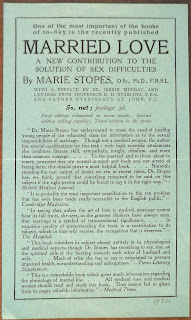 With birth control a hot button issue with the upcoming election, Dartmouth students can look inside Rauner library to gain some insight on topics that are still inciting national controversy. The papers of Juliet Barrett Rublee offer a peek into the beginnings of the birth control movement in America, with private letters and publications from which Planned Parenthood stemmed.
With birth control a hot button issue with the upcoming election, Dartmouth students can look inside Rauner library to gain some insight on topics that are still inciting national controversy. The papers of Juliet Barrett Rublee offer a peek into the beginnings of the birth control movement in America, with private letters and publications from which Planned Parenthood stemmed.Rublee became involved in the birth control movement after meeting Margaret Sanger at a literary salon in 1912 and was immediately drawn to the activist. Sanger, at that time just beginning her work in sex ed and the fight for birth control, would go on to become the infamous founder of Planned Parenthood. She and Rublee became fast friends in the 1910’s, just as the birth control movement was beginning to blossom and Sanger was forced into exile in Europe. The pair was in near constant communication over the following decades. While Rauner has an extensive collection of letters Rublee received from a number of people, including her husband and other birth control activists, her letters from Sanger are perhaps the most intriguing.
Sanger is a figure that has been portrayed in modern times as impossibly forward-thinking and inconceivably cruel, an opinion usually divided across political lines. However, her letters to Juliet Rublee instead show an emotional and passionate woman deeply invested in the issue of birth control. Her letters are intended to keep Rublee, one of Sanger’s major funders as well as a leader in the movement, in the loop on different fronts on the birth control movement. Sanger’s casual name-dropping of authors, radical political figures and celebrities paint a rich picture of the interconnected world of early-nineteenth-century radical politics.
The letters also offer a window into Sanger’s private life. While Sanger and Rublee were brought together by political activism, they also shared less lofty interests: the opera, worrying about illness, strange crash diets. Sanger and Rublee, despite their warnings to the other to burn the letters in fear of discovery, rarely censored themselves in their writing, leading to both sordid details and a few tersely worded fights. Some particularly juicy letters touch on Sanger and Rublee’s interest in psychic mediums, Sanger’s involvement in the free love movement and associated affairs, and hints at a relationship between Sanger and Rublee that borders on romantic.
Check out MS-731 to see how Juliet Barrett Rublee mixed her personal and political life in helping found the birth control movement in America.
Posted for Kate Taylor '13.


No comments :
Post a Comment